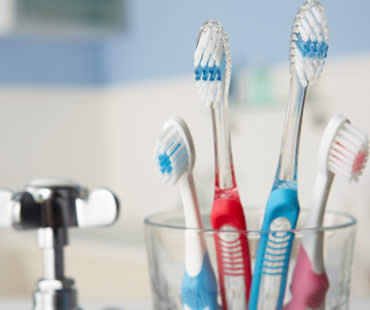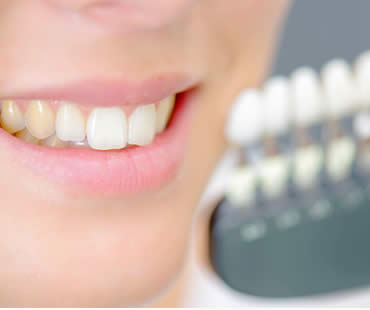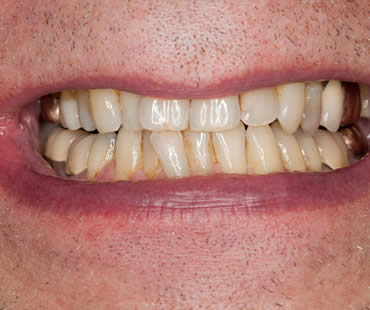
by Dr. Adkins | Mar 20, 2020 | Blog, Dental Information, Dental Topics 2
Chances are you would be disgusted at the thought of leaving your eating utensils on your bathroom counter exposed to germs, and never washing them but continuing to eat with them. This is essentially what you’re doing if you leave your toothbrush sitting out, and never sanitize or change it. Let’s talk about how to keep your toothbrush from being a germ-infested threat to your health.
Your toothbrush can be contaminated by bacteria, saliva, blood, and food particles with each use. Even after you rinse it with water, your toothbrush may appear clean but germs linger on the bristles. Some of the sources of bacteria on your toothbrush include:
- Your mouth, which transfers germs to your toothbrush during use.
- The environment, because bathrooms are often the most contaminated room in your house.
- The packaging, since toothbrushes aren’t sold in sterile packages they can arrive with germs already on them.
Here are some tips to guard your toothbrush from germs:
- Before and after you brush your teeth, wash your hands to get rid of germs.
- Rinse your toothbrush well with water, and then allow it to air dry.
- Store the toothbrush upright so that water can drain from it while drying.
- Consider storing your toothbrush in a dry area outside of the bathroom, away from humidity and toilet spray
- Replace your toothbrush every 3-4 months, or more often if you notice worn bristles.
- Do not share your toothbrush with anyone.
- Do not soak your toothbrush in disinfectant or mouthwash, which can lead to cross contamination
- Do not bother microwaving your toothbrush or running it in the dishwasher, because these tactics may damage your brush.
Schedule your appointment at our McDonough dental office

by Dr. Adkins | Feb 14, 2020 | Blog, Dental Information, Dental Topics 2
It’s hard to miss with advertisements and visits to the dentist that tartar is something you want to avoid for good oral health. But do you know what this substance is, how to keep from getting it, and what to do if tartar does develop?
What’s so bad about tartar?
Even if you brush and floss regularly, it’s impossible to get rid of all of the bacteria in your mouth. Bacteria and food residue combine to form plaque on your teeth. If left to thrive, plaque attacks your teeth and gums. It causes decay, gum inflammation, and will harden into tartar if not removed before it has the chance.
What does it do to my teeth and gums?
Tartar buildup makes it more difficult to brush and floss well, and tartar along your gums may lead to gum disease. Mild gum disease, or gingivitis, is often caused by plaque and tartar on your teeth. It can usually be reversed with careful dental hygiene. If left untreated, it will progress into periodontitis. This more serious gum disease can damage the bones and tissue that support your teeth, increasing your risk of tooth loss. It may also cause infections that contribute to heart disease and other health problems.
How can I control tartar?
Here are some ways to prevent tartar formation:
- Brush at least twice daily long enough to thoroughly clean every tooth and all of your gums. Consider using an electric toothbrush, which may be more effective for plaque removal.
- Use tartar-control fluoride toothpaste. It is formulated to help prevent tartar formation, and the fluoride can repair damage to your teeth that may have already begun.
- Floss every day to reach the areas that brushing cannot.
- Eat a healthy diet low in sugars and starches, and limit snacks between meals. Drink plenty of water to help rinse away plaque and bacteria.
- Don’t smoke because tobacco use has been shown to increase tartar buildup.
How do I get rid of it?
A professional cleaning is the only way to successfully remove tartar. See your dentist every six months for checkups and cleanings.
We look forward to seeing you in our McDonough dental office

by Dr. Adkins | Jan 31, 2020 | Blog, Dental Information, Dental Topics 2
You’ve probably seen what coffee can do to a cup. Those brown stains that you see left on your cup are also sticking to your teeth. Coffee is especially hard on your teeth due to an ingredient called tannic acid, which gets into the grooves and pits of your tooth enamel and can stain it brown. Certainly the ideal way to stop the staining is to quit drinking the java, but that’s an unrealistic solution for many people. So what else can you do to save your pearly whites?
Drink smart
First, try and reduce the amount of coffee you drink. If you drink a lot of coffee, even cutting out one cup a day can lessen the dark stains on your teeth. Another suggestion is to drink your coffee in one or two sittings instead of sipping it all day long. Also, try lowering the temperature of your coffee. The hotter the coffee is, the more easily it can stain your teeth. Just letting it cool a couple of degrees can make a difference to your teeth.
Rinse
After every cup of coffee you drink, rinse your mouth with room-temperature water. This will remove some of the staining elements before they have a chance to set in. The water also helps neutralize acids in your mouth, which will lower the bacteria in your mouth that can lead to cavities.
Use a straw
If you like iced coffee or tea, drink it with a straw so that the dark beverage doesn’t directly contact your front lower and upper teeth. Using a straw reduces your teeth’s exposure to liquids that can stain.
Whiten your teeth
Ask your dentist about professional whitening methods, as well as products you can try at home. There are even some brands of whitening toothpaste made especially for coffee drinkers.
Practice good hygiene
Brush your teeth several times a day, especially after drinking coffee. Flossing daily also helps prevent stains, and is important if you add sugar or cream to your cup of joe. See your dentist twice a year for professional cleanings, which can do a better job of removing stains and restoring your smile.
Our dental office is located in McDonough

by Dr. Adkins | Nov 22, 2019 | Blog, Dental Information, Dental Topics 2
Many people find foods such as cheese, yogurt, and milk to be a very enjoyable part of their diet. Not only are some of these dairy items tasty and nutritious, did you know they can also help your teeth and gums? Studies show that consuming dairy products regularly can lower the occurrence of dental diseases. Let’s see which dairy items you should consider incorporating into your diet and why.
Reduce gum disease
The primary benefit of dairy to your dental health is lowering your risk of periodontal disease. Also known as gum disease, this condition affects roughly 75 percent of Americans at some level. It may be minor gingivitis or advanced periodontitis. If left untreated, gum disease can cause tooth loss, contribute to heart disease and stroke, and worsen diseases like diabetes and osteoporosis. Lactic acid is one of the key ingredients in many dairy items, and researchers believe that lactic acid is related to reducing gum disease.
Choose your dairy
Just because a food is identified as a dairy product, that doesn’t necessarily mean it’s completely healthy for you. Here are some tips to help you choose the ideal foods and beverages for your dental health:
- Look for low fat and non-fat options.
- Choose white milk instead of flavored milk, such as chocolate. The added sugars can lead to tooth decay.
- Consider natural and organic products when possible.
- Select unsweetened yogurt without sugar or artificial sweeteners. A good alternative is Greek yogurt which you can add fruit or honey to create an appetizing, healthy snack.
Enjoy additional benefits
Avoiding gum disease isn’t the only benefit of eating dairy. It helps build strong teeth and bones, and is rich in vitamins that are good for your overall health. So the next time you get hungry, try some cheese or a glass of milk because these foods will not only satisfy your hunger but also keep you smiling.
Our dental office is located in McDonough

by Dr. Adkins | Sep 13, 2019 | Blog, Dental Information, Dental Topics 2
Plaque is your mouth’s enemy. It is a film of bacteria that forms on your teeth, and produces acid as it mixes with sugar from foods and drinks you consume. Over time, these acids destroy your tooth enamel and lead to decay. Plaque can also form under your gums and affect both the gum tissue and the bones supporting your teeth.
So how can you avoid getting the plaque that causes these problems? Here are some helpful tips.
Brush
Use a fluoride toothpaste to brush your teeth at least twice a day. Choose a soft-bristled toothbrush and brush all of your tooth surfaces, as well as your tongue.
Floss
As much as many people don’t want to, flossing your teeth every day is important in getting rid of plaque between your teeth and at your gum line.
Eat healthy foods
Some foods help keep plaque off your teeth. Munch on apples, cucumbers, carrots, and other raw vegetables and fruits. Crunchy foods like these will help clean your teeth while filling you up and giving you helpful nutrients.
Avoid junk food
On the other hand, limit the amount of junk food that you eat. Sugary drinks and foods introduce sugar into your mouth that will stick to your teeth and lead to plaque formation.
See your dentist
Even if you practice good oral hygiene, some amount of plaque usually forms. It hardens to become tartar, which can only be properly removed by your dentist. Dental checkups every six months will help you keep plaque under control, and a healthy smile on your face.
Schedule your appointment at our McDonough dental office

by Dr. Adkins | Aug 2, 2019 | Blog, Dental Information, Dental Topics 2
Porcelain veneers can transform your smile from one that embarrasses you to one that you’re proud to show off. A thin shell of porcelain is bonded onto the fronts of your teeth to improve the shape and color. If you’re looking to close gaps between your teeth, reshape your teeth, or brighten stained teeth, porcelain veneers may be your answer. Here are the answers to some frequently asked questions about veneers.
How do veneers work?
Made from durable and natural-looking porcelain, veneers are customized to fit your teeth. Your face shape, skin tone, eyes, height, and even your personality are considered when designing your dental veneers. They are bonded securely to your teeth to give you the smile you always wanted.
Is it a long process to get them?
The process for getting veneers usually takes about four to six weeks. At your first appointment, your teeth will be shaped and their surface will be slightly roughened. Impressions will be taken to create models of your mouth so that the veneers can be personalized for you. At the next appointment, your teeth will be cleaned and polished before a special adhesive is used to bond the veneers to your teeth. A high-intensity light is used to set the adhesive.
What will my teeth look like while I’m waiting for veneers?
After your teeth have been prepared for veneers, usually you will be fitted with specialized temporary veneers. These interim veneers look better than your original teeth, so you won’t feel self-conscious during the waiting period.
How long do veneers last?
Porcelain veneers typically last from ten to twenty years. Porcelain is very strong and durable, and resistant to stains and wear.
What are the advantages to veneers?
Since the bond to your original teeth is strong, porcelain veneers can be treated just like your own teeth. They appear very natural because the porcelain looks similar to your tooth enamel. Veneers can also protect your teeth from further damage if they are chipped or worn down, so they not only cover your teeth with a layer of protection but also create a beautiful bright smile.
Our dental office is located in McDonough








 (470) 665-5292
(470) 665-5292  E-Mail Us
E-Mail Us 
